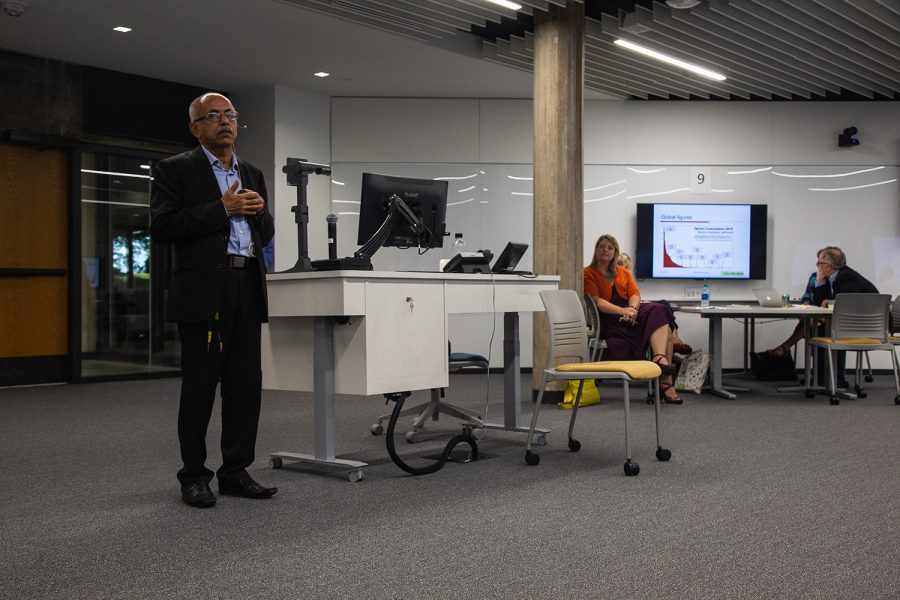Nobel Peace Prize nominee speaks at UI about medical field struggles in India
M.R. Rajagopal, a palliative-care activist and recipient of the Padma Shri Award, gives series of lectures on campus.
Dr. M. R. Rajagopal speaks at the College of Nursing on Monday, Sept. 17, 2018. Rajagopal was nominated for the 2018 Nobel Peace Prize for his work establishing Pallative care centers and services throughout India.
September 17, 2018
M.R. Rajagopal, a palliative-care physician, activist, and Nobel nominee, visited the University of Iowa on Monday for a series of lectures, which will continue today.
Rajagopal is the founder and chairman of Palliative India, an organization that seeks to improve quality of life of terminally ill patients and to advocate for death with dignity.
RELATED: Art project on palliative care brought to Iowa
India made the use of opioids illegal in 1985 with the Narcotic Drugs and Psychotropic Substances Act, and that has led to a health-care crisis because it leaves patients in needless pain. Rajagopal argues that the untreated suffering is akin to torture and that improving the quality of life is an integral part of health care.
Rajagopal noted that only 18 percent of the global population consumes more than 80 percent of opioids.
“Pain relief is not accessible to over 80 percent of the global population,” he said.
His organization has lobbied the Indian government to amend the law and allow patients to receive pain relief.
In addition to the physical effects of the law, Indians also struggle with the overwhelming cost of treatment. Out-of-pocket health-care expenditures pushed 5.5 million Indians below the poverty line in just one year, Rajagopal said.
He is the recipient of the Padma Shri Award, one of the highest civilian honors in India. He has been nominated for the 2018 Nobel Peace Prize for his work with his foundation.
Rajagopal is from Kerala, India, a state on the southwestern coast, where there are now 200 community-based palliative-care programs. The programs are largely thanks to Rajagopal’s efforts to provide a bridge between families and the health-care industry.
“Even in my country, it is possible, with a little bit of compassion and a little bit of encouragement, to bring that smile to somebody and to make sure that that person contributes to society and lives a good life,” he said.
The Fellowship Training Program in Hospice and Palliative Medicine in the UI Internal Medicine Department has had a long-standing relationship with Rajagopal and his foundation.
The Hospice/Palliative Program has sent students and faculty to work with Rajagopal in Kerala for the past nine years. Every year, 12 to 20 students learn about the inequities of pain relief with him, according to a press release from the Hospice/Palliative Program.
“The irony of the overabundance of opioids in the U.S. is that a simple morphine pill is not available to most Indians dying of cancer pain,” the press release said.
UI participants accompany Rajagopal on house visits and work with palliative-care patients.
UI pharmacy student Lyvia Bulman said she attended Monday’s noon lecture because of Rajagopal’s influence in her field.
RELATED: In different horizons
“We need more compassion, I would say,” Bulman said about the changes needed in the palliative care in the United States.
Rajagopal’s organization helps not only the patients but their families. Often, the devastating financial effects of illness cause children to drop out of school because their families cannot afford textbook fees.
Palliative India’s volunteers provide financial and emotional support for children until their education is complete.
To Rajagopal, the effort is just another aspect of health care.
“If health is a state of complete physical, mental, and social well-being, we shouldn’t be thinking about just the person with the disease,” he said. “Whole families will be important.”
He is scheduled for six lectures during his time at UI, including three lectures today.






